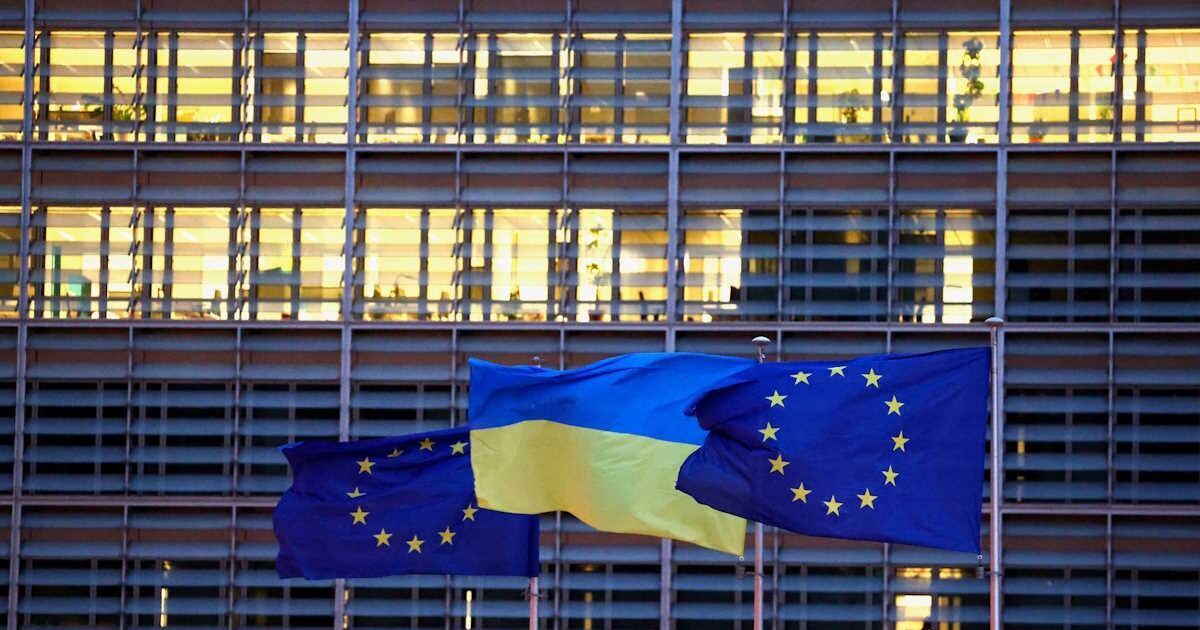Only the income from interest of its ‘frozen’ assets Russia have been used so far the EU to provide help to Kyiv.
However, this could soon be changed, as the US is pressing – and Berlin relaxes its resistance to a more aggressive attitude towards Russia. Until now, the German government has firmly contrary to the use of frozen assets of the Russian Central Bank directly for Ukraine funding.
Therefore, a year ago, the G7 states agreed to a compromise on the transfer of interest from interest to Kiev. But now the German government is moving – and so it could allow further steps.
Today (19.9.2025), EU finance ministers will discuss this sensitive “business” in an informal meeting in Copenhagen.
EU Finance Commissioner Valdis Dobrovskis plans to present various options. One idea is to use frozen assets for the purchase of interest -free EU bonds. The money could then be gradually transferred to Ukraine as a loan.
Alternatively, a “special purpose vehicle” is being examined, through which loans could enter Kiev. This would have the advantage that countries outside the EU, such as Great Britain and Canada, could also participate in guarantees.
Ukrainian President Volodimir Zelenski estimates the cost of war for the following year at $ 120 billion. This week he told Kiev that half of these amounts were needed by Western partners.
EUR 194 billion stored in Euroclear
Given empty funds to most EU capitals, Frozen Russian state reserves of 194 billion euros kept in the Belgian Euroclear Central Settlement now seem to be a tempting source. Especially because 170 billion euros of them are now kept as cash on the balance sheet because bonds have expired. EUROCLEAR’s six -month figures also show that Russian assets have yielded about € 2.7 billion in interest in the first six months of 2025.
Several EU diplomats report a change in the mood in the capitals. A few months ago, several governments were reluctant to touch the assets under any circumstances. Now, everyone is open to discuss at least options. However, the discussion is still at a very early stage.
Even the German government has abandoned its fundamental opposition. Several government representatives have said they would consider various choices along with their European partners and other G7 states. From the angle of Berlin, the confiscation remains taboo. A legally correct approach must be found.
There are two reasons for Climate change:
- There is a big gap in Ukraine funding next year. The International Monetary Fund (IMF), which supports Kiev through a assistance program, is currently calculating financial needs.
- Europeans are afraid that the US under President Donald Trump will sooner or later be withdrawn from Ukraine funding. This would mean that Germany, as the largest economy, would have to bear the main weight. Berlin also has no unlimited resources – although military assistance to Ukraine, like other defense spending, is no longer subject to debt brake.
The US is putting pressure
Therefore, it seems reasonable for Europeans to use Russian assets – this would also mean that Moscow would participate in the cost. This year, the G7 has already used interest revenue as a guarantee to lend 45 billion euros to Ukraine.
G7 – the US, Japan, Germany, France, Italy, the United Kingdom and Canada – contribute a share based on their economic production. The EU share is 18.1 billion euros. According to the Commission, 9 billion euros from this amount had been transferred to Kiev until August.
US has long demanded the seizure of Russian assets. They re -increased the pressure during a G7 finance ministers’ teleconference last week. EU foreign policy leader Kaya Callas and several Eastern European Government Chiefs have also expressed the support them in this direction.
Legal issues
Other governments, led by Belgium and Germany, have repeatedly ruled out this possibility.
They have already highlighted the European Central Bank (ECB) during last year’s debate. Central bankers warn of loss of confidence in the European Financial Center. They are afraid that this could lead other countries and investors to withdraw their assets from the EU.
There are also legal issues. Euroclear does not want to be held responsible and therefore insists that EU governments must take on all risks. Several lawsuits against Euroclear are already pending in Russian courts.
Since Euroclear is based in Belgium, government concerns are particularly intense. Berlin emphasizes the need to find a common solution that takes into account Belgian concerns.
Another problem is that the EU sanctions that have frozen Russian assets must be unanimously renewed every six months. This increases the risk for the potential buyers of EU long -term bonds. Therefore, EU governments will probably have to provide additional guarantees for repayment.
Given the plethora of problems and dangers, EU diplomats do not expect a quick decision. Even the use of interest revenue continued for several months. Eventually, however, the money was used. European capitals expect a similar result this time – even if the business is even thinner.
